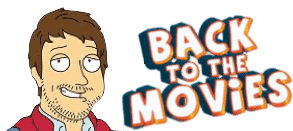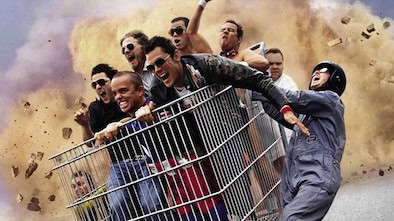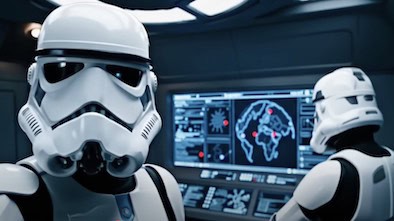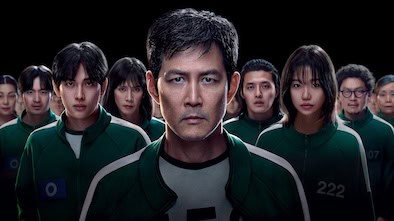Samuel Edwards discusses why Ridley Scott’s Black Hawk Down may just be the director’s most underrate dpiece of work to date.

A forgotten masterpiece in the war genre.
Upon examining Ridley Scott’s range of work, he has successfully proven his ability to make films in any genre.
From science fiction in Alien to more heavy-handed drama in the recent All the Money in the World.
However, Ridley Scott’s 2001 war film Black Hawk Down captures the sheer intensity, as well as the heartfelt commodity of the brave men during the battle of Mogadishu.
The story follows US marines who are sent to Somalia to bring aid over to the people.
Their mission was to capture the war lord, however when two of their helicopters are gunned down by Somalian’s, the mission then turns into a 16 hour long blood shredded nightmare.
By 2001, a few years after Gladiator, Ridley Scott was mostly known for his work in the sci fi genre.
A master of pioneering large worlds with original concepts, as seen in Alien (1979) and Blade Runner (1982). He is considered a pure artist in the medium. This time around, he is aided with a cinematic icon in the action genre, Jerry Bruckheimer, who seems to always be attached to big studio productions such as Armageddon (1998) and The Rock (1996).
This film separates itself from those previous films because the spectacle isn’t the films main selling point.
It’s the courage of the soldiers. Having said this, all of the action sequences are incredibly well orchestrated.
From the choice of camera angles, the acting and even the sound design, which is what the film won the Oscar for.
However, it’s the emphasis on the soldiers ongoing struggle to be there for one another that seems to be the highlight of the whole picture. Jerry Bruckheimer who was the producer, adapted the core themes from the book written by Mark Bowden to the film, which focuses on the bravery of the men.
The execution of the story was handled perfectly. It’s the realism of the warfare that the film gets spot on.
The soundtrack, which is composed excellently by Hans Zimmer, reinforces this theme of bravery. In particular, the score “leave no man behind” is really the essence of the film.
The use of acoustic instruments during the battle sequences resembles the Mogadishu environment, creating an impossibly realistic experience.
You feel every bullet that flies past these soldiers and that’s all due to the excellent work by the editor, Pietro Scalia.
The film seems to have helmed quite a production crew behind the camera. With the likes of Jerry Bruckheimer, Simon West was added as an executive producer, he would later direct the action heavy Expendables 2 (2012).
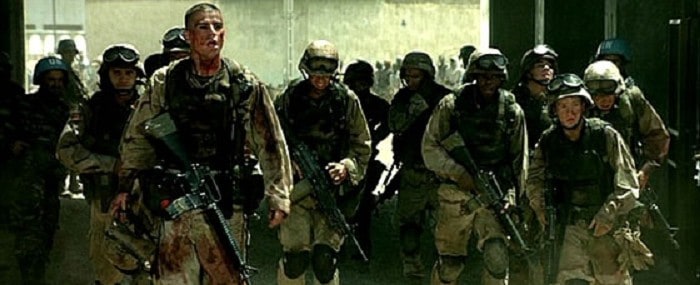
However, the cast of the film is ever more impressive, with actors such as Ewan Mcgregor, Josh Hartnett, Eric Banner, Orlando Bloom, Tom Sizemore and most notably Sam Shepherd who adds subtle intensity to his performance.
Some of these actors were new to the genre, whilst others had plenty of experience such as Tom Sizemore who starred in the epic Saving Private Ryan.
The combination of both parties in and off the camera seemed to work very nicely.
At first glance, this may seem like a B war film as there is little substance but because the technical aspects are handled so perfectly, the film gets away with having little to no substance in the character department because we pretty much know nothing about these soldiers and maybe that’s the point.
When we consider other films that have failed in this department, films such as Act of Valour (2012) in which the acting kept the film at a sub-par quality despite its terrific action sequences and more recently Michael Bay’s 13 Hours (2016) which wasn’t bad but it contained more style than substance, resulting in pure Bay-hem.
Whereas Ridley Scott tackled the sheer chaos of the situation with no obvious cinematic style just realism.
Both Act of Valour and 13 Hours are driven towards the excitement of war spectacle but don’t quite deliver in other departments such as the character development and its over use of themes on patriotism.
Black Hawk Down strikes this tone perfectly and still manages to inject intensity in every frame.
I believe Black Hawk Down felt more realistic than those films. Ken Nolan was also added to write the screenplay, he would later write Transformers The Last Knight.
Ken Nolan’s approach to the story was to imagine this not being a true story and to think of the project as its own work, can this film work as a separate piece and how can we get the audience invested in the story alone detached from cultural and historical understanding and expectations.
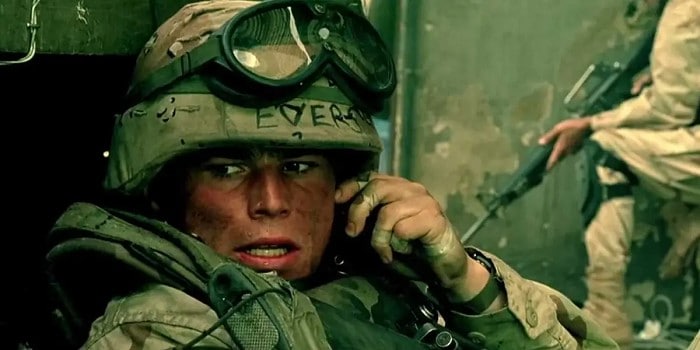
It was that unique approach that made this film stand out and work.
In modern age, Peter Berg’s Lone Survivor closely resembles the thematic focus of Black Hawk Down. In lone Survivor, we constantly get the sense that these soldiers will refuse to back down and leave their Conrad’s behind.
Other war films such as Dunkirk have shown this but not to the extent of films such as Lone Survivor and Hacksaw Ridge as it is the films main thematic pull.
Black Hawk Down, Lone Survivor and Hacksaw Ridge are all fantastic war films that got the formula right.
It’s about putting the bravery of the men at the films heart, respecting the source material, then add the spectacle. If these are done right then the film will succeed.
In the field of Ridley Scott’s work, he has not directed many films in the war genre.
The films that closely resembles the genre are the films Body of Lies and GI Jane, Black Hawk Done is still different to both of these releases. however, he has directed war spectacles that are more historic representations such as Gladiator and Robin Hood.
In terms of gun warfare, he hasn’t explored this area as much.
A few years ago, Ridley Scott reflected on his directorial effort, 18 years since its release.
He said, ‘I hope I was right’. This highlights that at the time, he was fairly new to the genre and he hoped that he got the execution spot on.
I believe he did, the film could have been more political but he decided to take the military route, which I believe was more intense and gave a more well-rounded approach to the source material.

Purchase Here
A 4k version of the film was released recently. With this version, you get the 4K, Blu Ray and a bonus disc which explores behind the scenes of the film in all modes of production including production design, marketing, the historical context, audio commentaries, interviews and more.
Grabbing this version is a must for fans of the film.
The critical reception, although positive, doesn’t accurately reflect the quality of the film. It scored a 76% on Rotten Tomatoes which I hope can get higher in the coming years.
However, the film won 2 Oscars and Ridley Scott received a nomination.
The film would gross 173 million dollars worldwide. The film is available on Amazon Prime and most streaming services other than Netflix.
To this day, it is one of my favorite war films. It still holds up and deserves a lot more attention.
I really believe this film got everything right, from the pre-production, source material and the overall execution.
If I had a grading scale, I would no doubt gives this 5 out of 5 stars.
